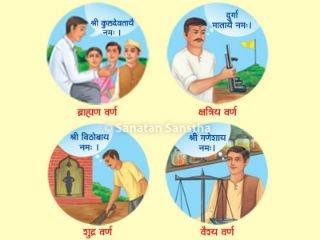
Prescribed duties, attitudes or rights of Brahman varna are to perform the following six acts (Shaṭakarma) – 1. Adhyayan (Study of Spirituality), 2. Adhyapan (Teaching Spirituality), 3. Yajan (Performing Yadnya), 4. Yaajan (Getting a Yadnya performed), 5. Daan (Offering) and 6. Pratigraha (Accepting offerings).
To be able to undertake a study of Spirituality, a Brahman should possess the qualities of an evolved seeker or a disciple, which are – curiosity about the Absolute Truth, desire for Liberation, humility, an attitude of service, surrender unto the Guru, obeying the Guru etc.
Regarding adhyapan, Shrikrushna says in the Shrimadbhagwadgita,
य इदं परमं गुह्यं मद्भक्तेष्वभिधास्यति ।
भक्तिं मयि परां कृत्वा मामैवैष्यत्यसंशयः ।।
– Shrimadbhagwadgita, Adhyaya 18, Shloka 68
Meaning : One who imparts this ultimate secret (Knowledge) to My devotees with intense love for Me, will undoubtedly come to Me.
Jnyandan (Imparting spiritual knowledge) is the most superior as compared to any other offering. Other varnas perform spiritual progress only for self-evolvement; however, the Brahman varna guides others along with its own progress. Since the Brahman desires to bring about spiritual emancipation of the society, his ‘I’-ness acquires an expansive form. This amounts to samashti sadhana (Sadhana for the spread of Spirituality).
Instructions on duties of Brahmans have been provided in the Rugveda (Mandal 8, Sukta 35, Rucha 16) as follows –
ब्रह्म जिन्वतमुत जिन्वतं धियो हतं रक्षांसि सेधतममीवाः ।
Meaning : Obtain knowledge, protect the pure intellect and destroy the demoniacal attitudes in society.
ब्राह्मणस्य तु देहोऽयं न कामार्थाय जायते ।
इह क्लेशाय तपसे प्रेत्य त्वनुपमं सुखम् ।।
– Mahabharat, Parva 12, Adhyaya 321, Shloka 23
Meaning : The gross body of the Brahman is not meant for enjoying happiness. The Brahman is born to perform austerities, facing difficulties on the earth. Only if this is performed will he obtain unparalleled happiness in Paralok (Higher subtle regions).
1. Responsibility related to the Nation
Deity Brahma created the universe. It was conducive for health, hence, it was called Satyayug. Later, when the attitude of the individuals deteriorated, the responsibility was given to the Brahmans by God. During that time, when Chaturvarna came into existence, God allotted the responsibility to Brahmans, which was considered as the superior varna to impart knowledge to the society. Imparting knowledge is protecting Brahmanattva. Yajurveda has said, ‘वयं राष्ट्रे जागृयाम पुरोहिताः ।’, which indicates the superior role of Brahmans in the society. ‘It means, that by keeping the torch of Dharma burning, we Brahmans are bringing about an awakening of Dharma in the Nation. Hence, the Nation will become enriched in its conduct and thoughts and will become radiant, which will make the life of the people happy’. Only for this purpose, Adi Shankaracharya built four Mathas (Seats) on the four sides of Bharat (India). The objective was that each Shankaracharya of the Matha should take care of 1/4th portion of the Nation.
Just as the king and the Nation are destroyed by the curse of a Brahman, so also, a great king and a great Nation can be built only by the Brahman himself. This will be clear from the following examples – Arya Chanakya and King Chandragupta, Samartha Ramdas Swami and Chhatrapati Shivaji. Chanakya destroyed the evil King Nanda and established the righteous ruler Chandragupta in his place; the same mission was carried out by Samartha Ramdas Swami.
2. Responsibility pertaining to Vishwashanti (Universal peace)
The happiness of the world depends on a Brahman. If he abides by Dharma, the world is happy and if he does not abide by Dharma, the world is unhappy. In the context of Bhagawadgita, Adi Shankaracharya has said that if a Brahman abides by Dharma, only then the Veda Dharma remains secure. If a Brahman abides by Veda Dharma, the Kshatriya, Vaishya and Shudra also abide by it. In this manner, when no one behaves in an unrighteous manner, there is deep love amongst all the varnas and castes, and everyone experiences happiness.
The earth rotates around itself and revolves around the sun. It has been proved by atomic science that there is a tremendous speed in the particles of the Mahabhutas. The one who can control this speed, that is, the one who possesses destroyer energy, as well as the energy to protect, is a Brahman. Hence, he is called a Jagadguru. The energy leading the world to destruction is now in the hands of people who are not Brahmans and are unrighteous. Earlier, this energy was in the hands of people who would hold the sacred seat of a Guru and the Kshatriyas, who would obey the instructions of the Guru.
3. Facing the consequences of the sins committed by others
Just as a king has to face the consequences of the wrong-doings of his subjects, so also, a Brahman has to face the consequences of the sins committed by everyone in society. Since a Brahman is an embodiment of fire, he can tolerate the consequences with ease.

 Serving a guest is the chief Dharma of Gruhasthashram
Serving a guest is the chief Dharma of Gruhasthashram What is the objective of Ashramvyavastha?
What is the objective of Ashramvyavastha? Why is Shudra varna considered to be the supreme one?
Why is Shudra varna considered to be the supreme one? What bhav should one possess while giving an offering?
What bhav should one possess while giving an offering? Importance of abiding to conduct as per Chaturvarna in Kaliyug
Importance of abiding to conduct as per Chaturvarna in Kaliyug Ultimate purpose of Chaturvarna is to obtain Anand
Ultimate purpose of Chaturvarna is to obtain Anand